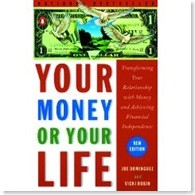Your Money or Your Life Book Review
/Your Money or Your Life
First Published: ADawnJournal.com Oct 16, 2008
I just finished reading Your Money or Your Life (YMYL) and I decided to do a review of this book for ADJ readers. Before talking about the book, let me give you some information about its author, Joe Dominguez. Vicki Robin is the co-author of YMYL.
Joe Dominguez
The late Joe Dominguez worked as a Wall Street analyst for ten years before retiring at the age of thirty-one. At that time, Joe had a portfolio of $70,000 and he had lived on a yearly income of $6,000 derived from that portfolio. YMYL was published in 1992 and Joe and Vicki donated all monies they received from the bestselling book and their other activities to the New Road Map Foundation—a non-profit organization Joe and Vicki founded to promote the reduction of our consumption. The book’s dedication is very fitting: “We dedicate this book to all of the people who are actively engaged in leaving our planet in better shape than they found it.” Joe Dominguez tragically died of cancer in 1997.
Let me describe the following main issues the authors tried to present in this book.
Life Energy
Life energy simply means the time we have here on earth. It can be broken down into hours or minutes. Let’s say you work 40 hours per week. It means you are trading 40 hours of your precious life energy for money. You are paying for 40 hours of your life with money. How you spend your life energy is up to you. You could spend these 40 hours doing something else, such as spending time with your family or spending time on your own terms—not working for someone else. The book has a nice chart showing the average remaining life expectancy based on your age. For example, if you are 40, you have 329,601 hours (thirty-seven years) of life energy remaining before you die.
It’s Not Making a Living, It’s Making a Dying
By working a traditional nine-to-five, we are killing ourselves. Just look at all those employees at the end of the day, whether they are coming out of an office building or a factory. We are killing our sense, relationships, health, soul, self-confidence in our jobs. We are sacrificing our life energy, our very lives, for our jobs. This is happening so slowly that we hardly ever notice that making a living is taking us closer to death; it’s actually making a dying.
We Make a Dying at Work so We Can Live It Up on the Weekend
We spend our precious life energy on the weekdays to earn money so we can spend it on the weekends. We work to pay our daily expenses, but we end up spending more than we make on things we do not need. So we go back to work to get money to pay interest on money we’ve already overspent. If you look deep into it, in the end you are wasting your life energy to pay for your credit cards or loan interests. Is it worth it to spend two month’s (or more) worth of work or life energy just to pay your interests?
What Is Your Real Hourly Wage
You may be making $25 an hour on paper, but that’s not your real hourly wage. Since we are trading our life energy for money, take a hard look at how much you are really earning. When you factor in all the job-related costs such as commuting, costuming, meals, stress, job-related illness, vacations etc., to your surprise you will find that your hourly wage is a lot less than what you have been making on paper. As a matter of fact, a $25 per hour wage can end up paying you $15 per hour after considering all the related expenses. Is this worth trading your precious life energy for?
We Are a Cancer to Earth
Our consumption-based society is sold on materialism. However, we do not realize that the Earth is the source of everything we use and resources are depleting so quickly that very soon the planet will not be able to accommodate our demands. We are a cancer to the Earth and one day this cancer will spread to a level from which there will be no return.
A New Road Map
Your Money or Your Life teaches you how to be financially independent by following a new road map. Once you a reach that point, you will no longer need to work for someone else. You start living on your own terms and start trading your life energy for yourself. The authors call this “The Crossover Point.” At this point, your expenses can be covered by your investment income and you will be all free from your nine-to-five and making a dying.
Things I Liked and Didn’t Like
The book has lots of tips on frugality and 100 sure tips to save money. Even if you don’t agree with the authors that a nine-to-five is actually making a dying, you can still use these tips to save lots of money.
I find the book a little too long. It could have been made at least 1/3 shorter. YMYL has too many real-life stories to conclude the authors’ perspectives—which I find annoying sometimes. Also, YMYL recommends that you put all your money in one place: in government bonds. I do not agree with this idea, as it will not provide any diversification. I still believe in the old adage, “Don’t put all your eggs in one basket.”
My Rating
I am giving Your Money or Your Life a “Must Read.” I recommend it highly, especially if you are tired of being trapped in a regular nine-to-five schedule.













